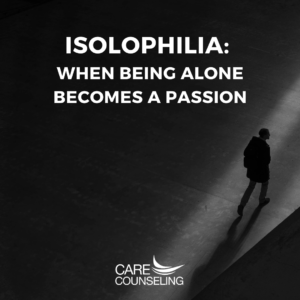Isolophilia: When Being Alone Becomes a Passion
 Isolophilia, a term that might sound unfamiliar, refers to a unique and often misunderstood phenomenon: a deep passion for solitude. In a world that often values social interactions and extroversion, isolophilia celebrates the joy, fulfillment, and personal growth that individuals experience when they choose to be alone.
Isolophilia, a term that might sound unfamiliar, refers to a unique and often misunderstood phenomenon: a deep passion for solitude. In a world that often values social interactions and extroversion, isolophilia celebrates the joy, fulfillment, and personal growth that individuals experience when they choose to be alone.
- Defining Isolophilia
Isolophilia is a concept that encompasses the deep appreciation of solitude and an intrinsic desire for alone time. Unlike social isolation, which implies a lack of social contact and can have negative connotations, isolophilia is about choosing to be alone and finding profound contentment in one’s own company.
It’s important to note that isolophilia is not about avoiding all social interactions but rather prioritizing and valuing time spent in solitude as an enriching and rejuvenating experience.
- The Many Faces of Isolophilia
Isolophilia can manifest in various ways and degrees, depending on an individual’s personality, lifestyle, and personal preferences. Some common expressions of isolophilia include:
- Solitary Hobbies: Engaging in activities like reading, writing, painting, or gardening, which are often done in solitude and provide a sense of fulfillment.
- Solo Travel: Exploring the world independently, immersing oneself in new cultures, and enjoying the freedom of solitary travel.
- Meditative Solitude: Practicing mindfulness and meditation to deepen one’s understanding of oneself and find peace in quiet introspection.
- Enjoying Solitary Meals: Savoring the pleasure of dining alone and relishing the experience of sipping coffee or enjoying a meal in a cozy café.
- Independent Work: Thriving in roles or professions that allow for solo work, whether it’s writing, coding, or artistic creation.
- The Benefits of Isolophilia
Isolophilia can offer a range of positive benefits for individuals who embrace and celebrate solitude:
- Self-Discovery: Spending time alone provides an opportunity for deep self-reflection and self-discovery. It allows individuals to gain a better understanding of their desires, values, and goals.
- Creativity and Productivity: Solitude can foster creativity and enhance productivity, as it provides an environment free from distractions where ideas can flow freely.
- Reduced Stress: Alone time can be a respite from the demands and stresses of social interactions, helping individuals recharge and reduce stress levels.
- Improved Mental Health: For some, isolophilia can be a vital component of maintaining good mental health, as it allows for emotional regulation and a sense of tranquility.
- Independence: Embracing solitude can foster a sense of independence and self-sufficiency, empowering individuals to rely on themselves for emotional well-being.
- Balancing Isolophilia and Social Connections
While isolophilia can be a deeply enriching and fulfilling lifestyle choice, it’s crucial to maintain a healthy balance between solitude and social connections:
- Quality Over Quantity: Rather than focusing on the quantity of social interactions, prioritize the quality of your connections. Choose relationships that bring joy and meaningful engagement.
- Communication: Openly communicate with friends and loved ones about your need for solitude. Most will understand and support your lifestyle choices.
- Scheduled Social Time: Plan social interactions or outings that align with your energy levels and preferences. You can enjoy social gatherings while still preserving your love for solitude.
- Boundaries: Set clear boundaries to ensure that alone time remains restorative and does not lead to social isolation. Find a balance that works for you.
- Self-Care: Regularly engage in self-care practices, such as mindfulness and meditation, to promote emotional well-being and maintain a healthy mental state.
- Embracing Isolophilia in a Social World
In a society that often values extroversion and constant social interaction, individuals who embrace isolophilia may sometimes encounter misunderstanding or misjudgment. However, it’s important to recognize that there is no one-size-fits-all approach to living a fulfilling life.
Isolophilia is a personal choice, and it’s essential to honor and celebrate your unique preferences and needs. By doing so, you can lead a life that is not only authentic but also deeply rewarding. Embracing isolophilia while also maintaining healthy social connections is the key to a balanced and fulfilling life.



























